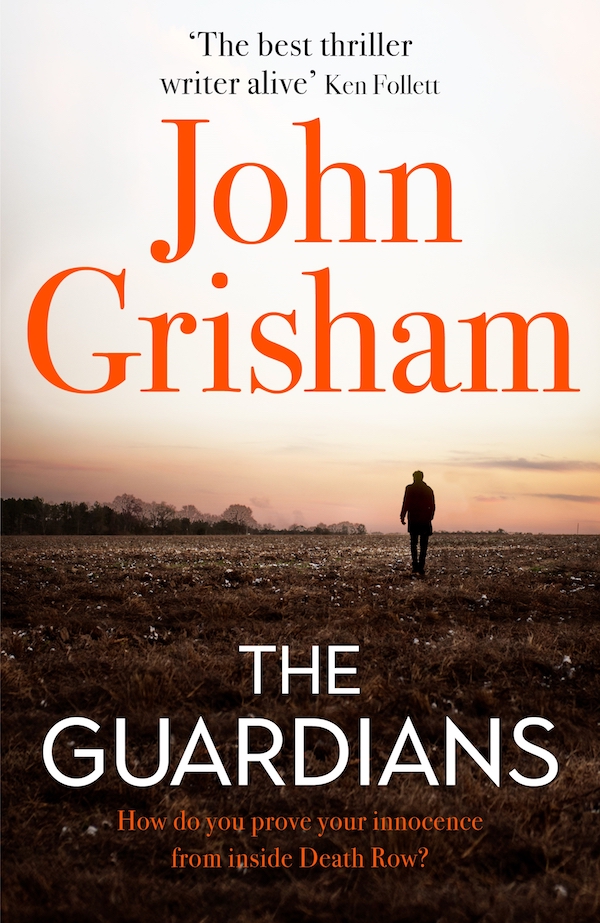Some two million Americans are currently in prison in America. A disproportionate number are black and nearly 200,000 are estimated to be innocent. John Grisham’s quietly horrifying new novel is a damning indictment of the inequities and corruption of the American legal system, which is shown to be not only corrupt but also profoundly inefficient and adept at making victims of those it incarcerates.
Over two decades before the story begins, in the small Florida town of Seabrook, a young white lawyer named Keith Russo was shot dead while working alone at his desk late into the night. There were no witnesses and it appeared at first a motiveless crime. Nevertheless, the police arrested Quincy Miller, a young black man – one of a minority in the conservative town. As a client of Russo’s, Miller had been publicly incensed at the mishandling of his divorce. According to the police, he used a shotgun and was linked to the crime by a blood-spattered flashlight found at the scene. Conveniently for the police, all the evidence vanished in a fire while in storage, and a little while later a young policeman – also black – who may have had some knowledge of what happened to the evidence was ambushed and murdered. The police chief who had taken personal charge of the case, himself suspected of being up to his eyes in the drug trade, enjoyed a long and affluent retirement.
 Quincy was tried, convicted, and sent down for life. For 22 years he languished in prison, maintaining his innocence. But no one was listening. He had no lawyer, and no-one to advocate for him on the outside. In desperation, he finally writes to Guardian Ministries, a small non-profit in Savannah Georgia, which is run on the proverbial shoestring while managing to yield extraordinary legal and detective work with but three employees – one of whom is our hero, Cullen Post, a lawyer who also happens to be an Episcopal minister. They are aided by the very clever Frankie, also black, who, having been exonerated after 14 years in prison is now a millionaire as a result of his legal compensation.
Quincy was tried, convicted, and sent down for life. For 22 years he languished in prison, maintaining his innocence. But no one was listening. He had no lawyer, and no-one to advocate for him on the outside. In desperation, he finally writes to Guardian Ministries, a small non-profit in Savannah Georgia, which is run on the proverbial shoestring while managing to yield extraordinary legal and detective work with but three employees – one of whom is our hero, Cullen Post, a lawyer who also happens to be an Episcopal minister. They are aided by the very clever Frankie, also black, who, having been exonerated after 14 years in prison is now a millionaire as a result of his legal compensation.
Grisham cites real-life cases as the inspiration for his fiction and it’s worth bearing in mind the case of the New York Central Park Five to understand the hideous miscarriages of justice of which the legal system is capable. Many of those who write to the Guardian Ministries are guilty; but a significant proportion are people who for one reason or another have been framed and become fall guys for the real criminals. If police, lawyers and judges rely on the testimony of inept witnesses and deeply flawed “experts”, the accused are easy to convict. And who has the incentive – let alone the resources – to investigate cold cases? Certainly not the state which might have to pay substantial damages if a convict is exonerated.
With Quincy Miller, Cullen Post gets far more than he’s bargained for. Powerful, ruthless people murdered Keith Russo, and they do not want Miller exonerated. “Our clients are in prison because someone else pulled the trigger. They’re still out there, laughing because the cops nailed the wrong guy. The last thing they want is an innocent lawyer digging through the cold case.” If they killed one lawyer twenty-two years ago, they might as easily kill another without a second thought. Still, the person who is in deadly danger is Miller himself. He’s attacked in jail by fellow convicts who have been contracted to kill, bribed not just with money, but also mobile phones and drugs. The real reason Russo was killed emerges in a final twist, reliant upon the complicity of unexpected sources. It is not a pretty story: greed and lust are at its heart.
Other run parallel to Post’s investigation on Miller’s behalf. Duke Russell has been on death row for nine years, convicted of rape and murder, and is but an hour away from execution when Post manages a stay of execution. In the compass of his taut, dispassionate prose, Grisham actually manages to make bureaucracy interesting. The personalities of judges and prosecutors are as crucial as those of innocent prisoners, and decidedly not-so-innocent.
The Guardians is one of Grisham’s most quietly ferocious depictions of America’s dysfunction. He brings home the scale of the resulting human suffering and hones in on the hypocrisy of the richest country in the world which enshrines the highest aspirations for the human being in its founding constitution. Beyond the intertwining of plot and personality, he brilliantly conveys the texture of the South – the endless hours of driving, cheap meals in diners, lives lived at the very edge against the starkly contrasted mansions of wealthy lawyers. Among the most successful lawyers are those, ironically, who sue the State on behalf of wrongfully-convicted prisoners. Such huge amounts of money could be better spent fighting corruption and eradicating inefficiency. Grisham never lets his message interfere with the fascinating narrative. But from the nail-biting postponement of Russell’s execution to the culmination of Miller’s struggles, irony abounds. Grisham’s touch is light: his do gooders may be religious but they never preach.
- The Guardians by John Grisham (Hodder, £14.99)
- Read more book reviews on theartsdesk















Add comment